A brief history of African click words
In much of southern Africa, it can be more polite to click
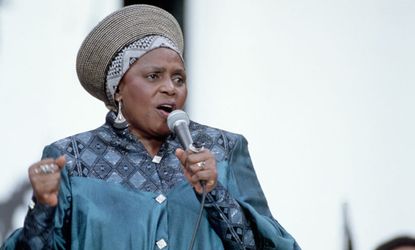

You probably know what click sounds are. Some languages of southern Africa are famous for having them, thanks in part to being featured in such cultural vectors as the movie The Gods Must Be Crazy and Miriam Makeba's song "Qongqothwane," better known as "The Click Song." They're sounds that English speakers make — but not as part of words. We use them as sounds on their own for such things as expressions of disapproval ("tsk"), or to imitate knocking, or to encourage a horse.
Imagine, now, if we started using clicks in our words like other sounds. And I don't mean borrowing words from one of the languages that use them. I mean sticking them in the middle of words we already have. What if we replaced the c in coffee with a click? Or the t in tea?
This is not the sort of thing that is generally supposed to happen in languages. Sure, languages borrow sounds — English has a few sounds it borrowed from French, such as the "zh" we say in words such as measure, treasure, and garage. But that sound came over as part of borrowed words. It's not usual for a language to borrow a sound and swap it into the middle of words it already has. But that's exactly what Zulu, Xhosa, and some related languages of South Africa did.
Subscribe to The Week
Escape your echo chamber. Get the facts behind the news, plus analysis from multiple perspectives.

Sign up for The Week's Free Newsletters
From our morning news briefing to a weekly Good News Newsletter, get the best of The Week delivered directly to your inbox.
From our morning news briefing to a weekly Good News Newsletter, get the best of The Week delivered directly to your inbox.
That's right. Every single click in Miriam Makeba's "click song," which is in Xhosa, is a sound that was borrowed from a neighboring language and swapped into existing words — and not all that long ago, either.
There are two groups of languages in southern Africa that have clicks: the Khoisan languages and certain languages of the Niger-Congo family, most notably Zulu and Xhosa. The Khoisan languages have had clicks in them from time immemorial, and their speakers have always been in the southern part of Africa. Zulu, Xhosa, and other languages related to them have had clicks only for a few hundred years. They belong to the group of Niger-Congo languages broadly called Bantu (except in South Africa, where the designation Bantu was used in racist policies). They are completely unrelated to the Khoisan languages; the Niger-Congo languages originated in and around present-day Nigeria and spread as their speakers spread.
Scholars have long thought that Zulu, Xhosa, and related languages borrowed clicks from Khoisan languages through intermarriage. But the original idea they had was that Bantu warriors had taken brides from Khoisan peoples, possibly by force, and that the warriors were away from home so much that the children picked up clicks from their mothers and used them in the language of their fathers.
There are some problems with that theory. First of all, the relation between the Bantu cultures and the Khoisan cultures at the time of the borrowing was more of a friendly trading relationship, not one of military conflict. The intermarriages probably happened about the same way intermarriages between, say, Americans and Canadians happen — or perhaps a bit more often. Secondly, though, when children grow up with parents who speak two languages, they don't randomly blenderize the languages. They learn both languages, and they learn what sounds go in what language.
Around 1990, a linguist named Robert Herbert actually looked at the societies in question closely enough to spot a much more likely — and much more interesting — cause: a thing called hlonipha. Hlonipha is a kind of "respect" speech. In the Zulu and Xhosa cultures (less so in some areas now), certain people are not supposed to say the names of certain other people, or even say things that sound like their names. A woman wouldn't say the name of her father-in-law, for instance. Imagine if your father-in-law was named William Jackson. Not only would you not say William or Jackson, you also wouldn't say will, jack, jacks, or maybe even yum or son. So what would you say?
Well, you could use a paraphrase, sort of like how superstitious actors say "The Scottish Play" instead of "Macbeth." But you could also just swap in another sound. But what sound could you use that wouldn't make it a different word that might mean something else, and would still make it understandable? The Khoisan wives knew just what to use: clicks.
Now, this might seem like it would result in a different set of click words for each person. But two factors helped anchor the clicks. First, some words were the same for all people — the name of the king, for instance, but also the names of some animals and things that people wished to avoid trouble with. No need to say "the you-know-what" when you could just slip a click into the name of, say, the snake.
The second factor is that as clicks became associated with polite speech, people would use them more generally in words when they wished to sound polite, even if the words weren't names they needed to avoid. Certain words would get variants that were clickless for general use but clicked for polite speech. And from this, there came to be some word pairs with different shades of meaning — for instance, a click-free word meaning "pour out" and a clicked word meaning "sprinkle ceremonially." And the click words spread through the languages. About 15 percent of Zulu and Xhosa words have clicks, including the name of the language Xhosa. (In Khoisan languages, it's 40 to 60 percent.)
But that doesn't answer one other question: Where did the Khoisan languages get clicks from? Why do they have clicks when almost no other languages do?
A few theories have been propounded. One scholar, Alec Knight, proposed about 10 years ago that clicks were useful for the Khoisan cultures in particular because they are (or were) hunter-gatherer cultures, and the click sounds are just like forest sounds, so they wouldn't startle animals if they used them when they were hunting.
There are some problems with this idea. First, human societies have in general started out as hunter-gatherer societies, and some still are, while many of the Khoisan peoples haven't been hunter-gatherers for a long time, so why only the Khoisan? Second, whispering and gestures have served hunters elsewhere just fine. And you can't whisper a click. It sounds like a branch snapping. Picture yourself sneaking up on a deer. Suddenly you step on a twig and it snaps. What happens next? The deer bolts, of course. Look, a lateral click is a common sound used to get a horse to move.
So why do these languages have clicks when most others don't? Well, actually, most others do — they just don't use them as sounds in words. Tsk! And any given thing that can be used in speech will likely be used somewhere by someone. The more natural and automatic it is to integrate into language, the more languages will have it — nearly all languages have some version of the vowels "ah," "oo," and "ee," for instance. The harder it is to use in words, the fewer languages will have it — Czech's famously hard ř sound doesn't show up in too many languages.
So, why the Khoisan languages? As well them as any — and they went a long time without a lot of interference from other languages, so the clicks didn't get pushed out. And more recently, they've been clicking with some Bantu languages, too.
Create an account with the same email registered to your subscription to unlock access.
Sign up for Today's Best Articles in your inbox
A free daily email with the biggest news stories of the day – and the best features from TheWeek.com
James Harbeck is a professional word taster and sentence sommelier (an editor trained in linguistics). He is the author of the blog Sesquiotica and the book Songs of Love and Grammar.
-
 Today's political cartoons - April 14, 2024
Today's political cartoons - April 14, 2024Cartoons Sunday's cartoons - Trump Derangement Syndrome, social media dangers, and more
By The Week US Published
-
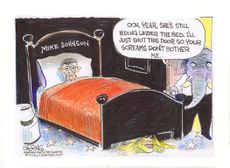 5 rambunctious cartoons about the House speakership standoff
5 rambunctious cartoons about the House speakership standoffCartoons Artists take on Mike Johnson's night terrors, the Speaker's chair, and more
By The Week US Published
-
 The Week Unwrapped: Ultrarunning, menswear and a meaty row
The Week Unwrapped: Ultrarunning, menswear and a meaty rowPodcast Is the "Hardest Geezer" a high-endurance trendsetter? Will Ted Baker survive? And what's the beef with lab-grown meat?
By The Week Staff Published
-
 In the future, will the English language be full of accented characters?
In the future, will the English language be full of accented characters?The Explainer They may look funny, but they're probably here to stay
By James Harbeck Published
-
 10 signature foods with borrowed names
10 signature foods with borrowed namesThe Explainer Tempura, tajine, tzatziki, and other dishes whose names aren't from the cultures that made them famous
By James Harbeck Published
-
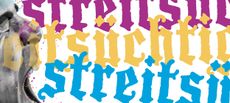 There's a perfect German word for America's perpetually enraged culture
There's a perfect German word for America's perpetually enraged cultureThe Explainer We've become addicted to conflict, and it's only getting worse
By Bonnie Kristian Last updated
-
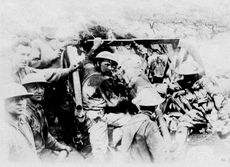 The legacy of World War I
The legacy of World War IThe Explainer The Great War ended 100 years ago this month. How does it still shape our world now?
By The Week Staff Published
-
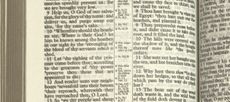 The death of sacred speech
The death of sacred speechThe Explainer Sacred words and moral terms are vanishing in the English-speaking world. Here’s why it matters.
By Jonathan Merritt Published
-
 The delicate art of using linguistics to identify an anonymous author
The delicate art of using linguistics to identify an anonymous authorThe Explainer The words we choose — and how we use them — can be powerful clues
By James Harbeck Last updated
-
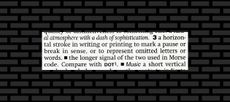 Dashes and hyphens: A comprehensive guide
Dashes and hyphens: A comprehensive guideThe Explainer Everything you wanted to know about dashes but were afraid to ask
By James Harbeck Published
-
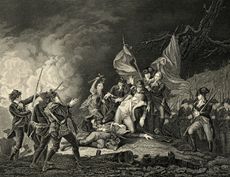 A brief history of Canadian-American relations
A brief history of Canadian-American relationsThe Explainer President Trump has opened a rift with one of America's closest allies. But things have been worse.
By The Week Staff Published